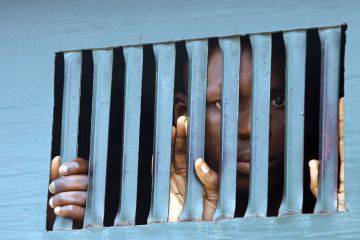Global Issues
Corruption: A little cheer from Transparency International -By Ayo Olukotun

Let us begin with an optimistic, short take by looking closely at what happened over the weekend at Ifaki in Ekiti State. Nigerian politicians, it is well known, have a reputation for going for broke when it comes to political competition. Sometimes, they would even threaten to set the house on fire and to show they mean it ignite a little fire in a little corner of the house. We are so used to seeing them disagree acrimoniously that it makes news when they, across pitched camps, engage in back slapping and embrace one another with pronounced cordiality. And so, it was somewhat extraordinary when the immediate past governor of Ekiti State, Dr. Kayode Fayemi, and the incumbent governor, Mr. Ayo Fayose, across party barriers and ever rising walls of discord embraced each other at the 60th birthday celebration of Mr. Segun Oni, National Deputy Chairman, South, of the All Progressives Congress.
A few days before the event, Fayose had extended an olive branch to Oni by restoring his privileges as a former governor which were abrogated by Fayemi on the controversial grounds that Oni’s tenure was unknown to the law. It is ironic that those privileges were not restored by Oni’s new party, the All Progressives Congress but by a governor elected on the platform of the Peoples Democratic Party. We probably should not make too much of the camaraderie on that occasion but it does signal with respect to Nigeria’s bedevilling divisions that someday, perhaps, the flaming swords of violent political competition may be turned into ploughshares deployed to nation-building and enhanced productivity.
The second titbit is a little troubling because it concerns the frequency with which jailbreaks are occurring across the nation, complicating an already fragile security situation. The latest escapade occurred on Saturday in Minna, Niger State, where 10 gunmen broke through what was supposed to be the state’s Maximum Prison on David Mark Road. The gunmen reportedly shot the warders on duty and went on to set the prisoners free. Similar tragedies, it will be recalled, took place recently in Ado-Ekiti in Ekiti State and Lokoja, Kogi State. Considering that the prisons represent the authority and correctional infrastructure of the state, it is disconcerting that they have become so weakly resourced to the extent of being easily overrun by roving criminal gangs, not unrelated to Boko Haram. This raises valid queries as to the capability of our law and order institutions and sends jitters across the social landscape because hardened criminals are on the loose. Let there be no more alarms set off by recurrent jailbreaks.
Now, the main comment. It is cheery news, depending on how you interpret it, that Transparency International in its 2014 annual report rated Nigeria as the 39th most corrupt country in the world out of 174 surveyed. This does not ordinarily call for celebration as the country remains in the bottom league; but when viewed in the context of last year’s position of 30th, it suggests that there has been an improvement in the way the world perceives the country. One possible explanation for the improvement is that unlike 2013, when Nigeria’s rating was clouded or set back by some publicised scandals, 2014 has been relatively free of corruption scandals. The fact that Jonathan eventually eased out from the cabinet Princess Stella Oduah following the rackets at the Ministry of Aviation may have counted too. Of note, in this connection, is that the report which was arrived at by a combination of opinion surveys and expert assessment may have been influenced by the 2015 World Bank document devoted to measuring the ease of doing business; in which Nigeria notched up its position by five points.
Unsurprisingly, publicists of the administration such as Reno Omokri, President Goodluck Jonathan’s Special Assistant on New Media, enthused that the TI report is “a result of clinical, surgical incisions made by President Jonathan at the centre of corruption”. A critical appraisal, while noting the upgrade, will concede that much more needs to be done for Nigeria to occupy its deserved moral leadership position both on the continent of Africa and globally.
Interestingly, Jonathan, while announcing his intention to run for a second term as Nigeria’s president, promised to tackle corruption with renewed vigour while the APC has also indicated that it would build a strong plank around the anti-corruption agenda. Time will tell however whether these promises represent a form of political correctness or whether the political class has truly signed in on the reformist train which the country badly needs.
Undoubtedly, and as TI correctly observes, public sector corruption is a global scourge to the extent that more than two-thirds of the countries researched scored below 50 out of a possible 100. Obviously, however, some countries are more mired in corruption than others and Nigeria as a continental leader is one country that has been unable so far to match its leadership credentials with the moral profile of countries such as Botswana, Cape Verde, Rwanda and South Africa. Part of the reasons why this is so is the obscene gap between the holders of public offices and the rest of the citizenry. A member of the Freedom of Information Coalition posted on the listserv last week information gleaned from The Economist magazine concerning the outrageous gap between the salaries of Nigerian senators and the lawmakers of other countries on the one hand as well as between the salaries and emoluments of our senators and the average Nigerian worker on the other.
Broken down into separate compartments, the privileges of our senators include hefty amounts denominated as hardship allowance, constituency allowance, newspaper allowance, research allowance, wardrobe allowance, entertainment allowance, personal assistants and several others. The special report by The Economist went on to say that “while the salary of a Nigerian lawmaker is 116 times the country’s GDP per person, that of a British member of parliament is just 2.7 times”. When you factor that this scandalous profligacy occurs at all levels of government, namely, federal, state and local, then it is not difficult to see why there is such a fight- to-finish desperation in the jostle for political offices and why corruption flourishes in the country.
Given the disproportionate share of national resources cornered by political institutions, it is little wonder that this mentality of taking the money and running percolates virtually every sector of our national life. To redraw the country’s moral architecture and national integrity system will include a frontal attack on the alarmingly skewed distribution of national resources in favour of the politically advantaged. This may be an audacious undertaking but the current circumstance of our declining economic fortunes should make it easier for us to take those long deferred, hard decisions. We do not have to reinvent the wheel; we only need to learn from the example of a country like Hong Kong which moved up from being one of the world’s most corrupt countries to one better rated on the Corruption Perception Index than the United States and Britain. While drawing a little cheer from the TI’s latest report, the political class and the civil society are enjoined to brace themselves for a more vigorous attack on public sector corruption.




















